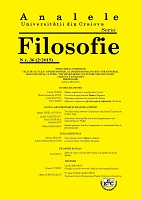VICIU, PĂCAT ȘI VINĂ ÎN ETICA LUI ABÉLARD
VICE, SIN AND GUILT IN ABELARD’S ETHICS
Author(s): Adriana NeacșuSubject(s): Ethics / Practical Philosophy, Philosophy of Middle Ages
Published by: Editura Universitaria Craiova
Keywords: vice; sin; will for evil; evil intention; accomplishment of sin; guilt; evil deed without sin; punishment; forgiveness;
Summary/Abstract: In this article I will emphasize the distinctions made by Abelard between some ethical concepts very closely related to each other but which do not be confounded: vice, sin, will for evil, evil intention, accomplishment of sin and guilt. So vice is a habit of the spirit that inclines man toward sin without necessarily determine its committing; sin is the acquiescence of spirit to evil, and it has as a principle the human imperfection; will for evil is not the same with sin, because sometimes the will is there, but it not leads to acquiescence and sometimes man sins involuntary, but forced by circumstances; evil intention, although always involves the will for evil, it is different from this by its power and determination, and because it is always engine of a concrete action; accomplishment of sin is its fulfillment in practice, but adds nothing to the gravity of committing the sin in mind, because sin belongs to the spirit; but guilt is always involved by sin. Also, I will call into question Abelard’s point of view about evil deed without guilt, so without sin, and, in close connection with all these concepts, I will highlight Abelard’s conception about human responsibility, about divine punishment and the ways which man can acquire forgiveness from God.
Journal: ANALELE UNIVERSITĂȚII DIN CRAIOVA. SERIA FILOSOFIE
- Issue Year: 2/2015
- Issue No: 36
- Page Range: 133-164
- Page Count: 32
- Language: Romanian

